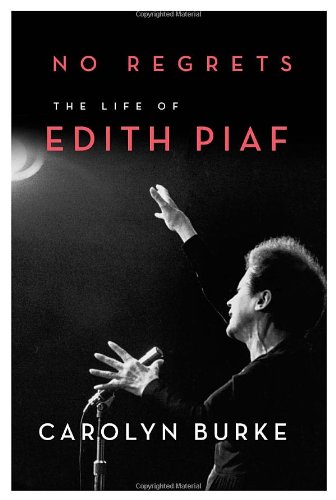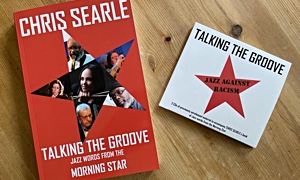Home » Jazz Articles » Book Review » Carolyn Burke: No Regrets - The Life of Edith Piaf
Carolyn Burke: No Regrets - The Life of Edith Piaf
 No Regrets: The Life of Edith Piaf
No Regrets: The Life of Edith Piaf Carolyn Burke
304 Pages
ISBN: 0307268012
Alfred A. Knopf
2011
In the 20th century, France produced two celebrities for which the New World has no equal: Serge Gainsbourg (1928-1991) was in international entertainment polymath who had his thumb in every media pie extant. He was a singer, songwriter, composer, poet, actor and director. His closest American equivalent is a combination of Tom Jones, Phil Spector and Prince. He was a cultural icon as well as a celebrated musician. Likewise, a generation earlier, France produced from her streets Edith Piaf, artiste lyrique. Piaf, through her carefully sculpted story and image, was of a greater iconic stature than even Gainsbourg. In her biography of Piaf, Carolyn Burke submits that the combination of Billie Holiday and Judy Garland is as close a Western equivalent to Piaf as can be understood. Her burial ceremony had some 100,000 people in attendance. To present American audiences, Piaf is known by her chansons strategically placed in movie soundtracks like Saving Private Ryan (Paramount Pictures 1998) and Inception (Warner Brothers, 2010). But she was much, much more to the Europeans.
With adulation like that, "facts" about Piaf recorded in her numerous biographies are preceded by, "It is said..." It is not so much a matter that Piaf's life is shrouded in mystery as it is shrouded in Romance and that Romance has been perpetuated by the media. Exactly like Robert Johnson (or Tommy Johnson or Peetie Wheatstraw) going to the crossroads at midnight to sell his soul to the devil, Piaf was literally born on the pavement of Rue de Belleville 72, an assertion Piaf did nothing to correct considering her birth certificate was extant and indicated otherwise. But being born in a hospital is not sexy enough for the story. This is merely the beginning of what would become the mythos of Edith Piaf.
Piaf was discovered by a nightclub owner while she was singing in the streets of Place Pigalle in Paris (something like San Francisco's Tenderloin District) in 1935. The nightclub owner, Louis Leplée, was murdered, giving Piaf a notoriety that added to her developing mystique. She began a long artistic relationship with French playwright and poet Jean Cocteau, adding to her exposure and fame. She became a French star before and during World War II and an international one after specializing in song, stage and movies. She lived her life allegro con brio, loving many, marrying slightly fewer and ingesting chemicals in a manner not unlike Elvis Presley in the 1970s. While her story is not that uncommon in entertainment, her fame is. Piaf was a singer of la chanson realiste, realistic songs that resonated with the whole populace of Paris. Carolyn Burke's No Regrets: The Life of Edith Piaf is exactly this, a la chanson realiste.
Burke sought to carefully remove the contrived from Piaf's story, leaving the success and a large part of the Romance intact. The book is a brief three-hundred plus pages, following Piaf's rise to fame, hectic life, and final quenching of an indomitable spirit. Burke chose to highlight Piaf's success while only mentioning her famous chemical dependency with respect to its disruptive effect on her performing. Piaf was a candle that burned brightly, with great heat, extinguishing, almost violently, in the end. Burke's account is beautifully written, capturing all of the fragrance of Piaf's life. Of the singer's account of her Pigalle period, Burke writes:
"Piaf's memoirs are reticent about this period.(The Wheel of Fortune omits the Pigalle years; Ma Vie (My Life) reduces her time among the local pimps and prostitutes to a series of affairs, including one with the man who became her protector—though he offered a different type of protection from the sort she had imagined. But if Piaf preferred to forget the dark poetry of Pigalle, its smoky atmosphere colored her songs, the sulfurous repertoire for which she became known.
Piaf's death, like her birth, was subject to much Romanticizing. Burke describes Jean Cocteau's hastily composed eulogy:
"'Edith Piaf burned herself up in the flames of her glory,' he began, 'I never knew anyone who was less protective of her spirit. She didn't dole it out, she gave everything away...Like all those who live on courage, she didn't think about death; she defied it. Only her voice remains, that splendid voice like black velvet that enhanced whatever she sang. But if I still have her voice, I have, alas, lost a great friend.' An hour later the poet died—giving rise to the myth that France had lost two of its brightest stars on the same day."
Like Jefferson and Adams dying within hours of one another on July 4, 1826, the 50th anniversary of the US Declaration of Independence, these circumstances could have never been fabricated by the most fertile mind.
Burke's book is a winning addition to the Piaf bibliography. The author was both reverant and real, clearly emphasizing what what she wanted to but not simply ignoring what she found prurient. She depicts Piaf proudly as the artist herself would have enjoyed.
< Previous
This is My Music
Next >
Into The Air
Comments
Tags
For the Love of Jazz
 All About Jazz has been a pillar of jazz since 1995, championing it as an art form and, more importantly, supporting the musicians who create it. Our enduring commitment has made "AAJ" one of the most culturally important websites of its kind, read by hundreds of thousands of fans, musicians and industry figures every month.
All About Jazz has been a pillar of jazz since 1995, championing it as an art form and, more importantly, supporting the musicians who create it. Our enduring commitment has made "AAJ" one of the most culturally important websites of its kind, read by hundreds of thousands of fans, musicians and industry figures every month.






















